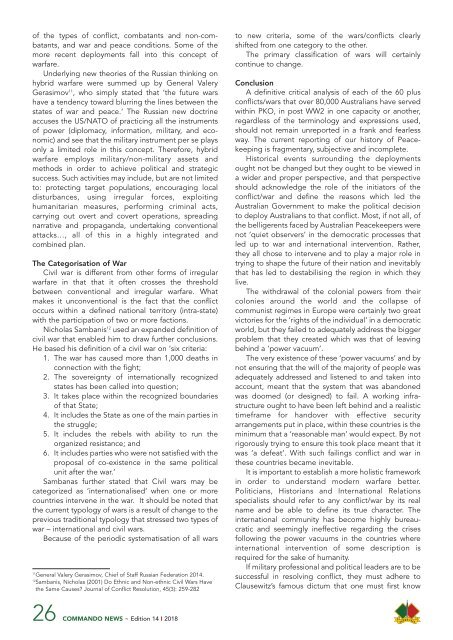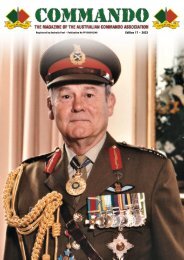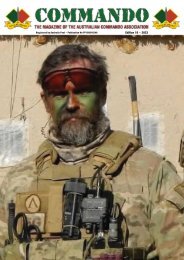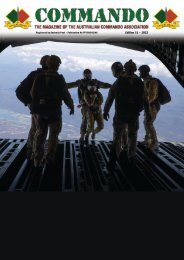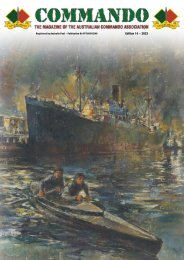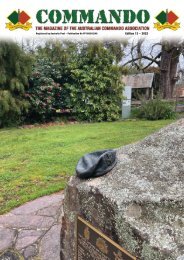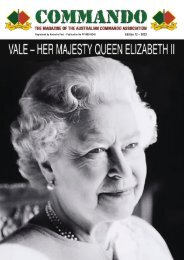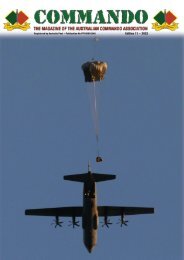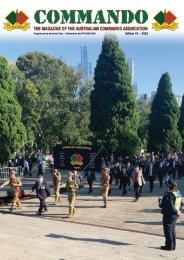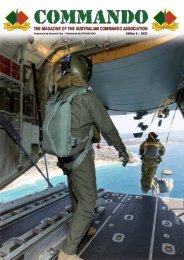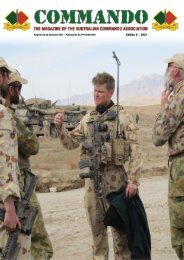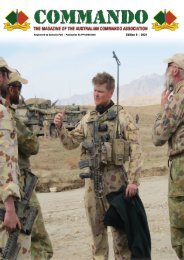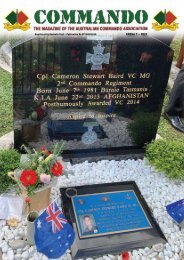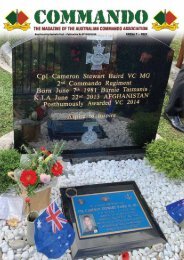Create successful ePaper yourself
Turn your PDF publications into a flip-book with our unique Google optimized e-Paper software.
of the types of conflict, combatants and non-com -<br />
batants, and war and peace conditions. Some of the<br />
more recent deployments fall into this concept of<br />
warfare.<br />
Underlying new theories of the Russian thinking on<br />
hybrid warfare were summed up by General Valery<br />
Gerasimov 11 , who simply stated that ‘the future wars<br />
have a tendency toward blurring the lines between the<br />
states of war and peace.‘ The Russian new doctrine<br />
accuses the US/NATO of practicing all the instruments<br />
of power (diplomacy, information, military, and eco -<br />
nomic) and see that the military instrument per se plays<br />
only a limited role in this concept. Therefore, hybrid<br />
warfare employs military/non-military assets and<br />
methods in order to achieve political and strategic<br />
success. Such activities may include, but are not limited<br />
to: protecting target populations, encouraging local<br />
disturbances, using irregular forces, exploiting<br />
humanitarian measures, performing criminal acts,<br />
carrying out overt and covert operations, spreading<br />
narrative and propaganda, undertaking conventional<br />
attacks…, all of this in a highly integrated and<br />
combined plan.<br />
The Categorisation of War<br />
Civil war is different from other forms of irregular<br />
warfare in that that it often crosses the threshold<br />
between conventional and irregular warfare. What<br />
makes it unconventional is the fact that the conflict<br />
occurs within a defined national territory (intra-state)<br />
with the participation of two or more factions.<br />
Nicholas Sambanis 12 used an expanded definition of<br />
civil war that enabled him to draw further conclusions.<br />
He based his definition of a civil war on ‘six criteria:<br />
1. The war has caused more than 1,000 deaths in<br />
connection with the fight;<br />
2. The sovereignty of internationally recognized<br />
states has been called into question;<br />
3. It takes place within the recognized boundaries<br />
of that State;<br />
4. It includes the State as one of the main parties in<br />
the struggle;<br />
5. It includes the rebels with ability to run the<br />
organized resistance; and<br />
6. It includes parties who were not satisfied with the<br />
proposal of co-existence in the same political<br />
unit after the war.’<br />
Sambanas further stated that Civil wars may be<br />
categorized as ‘internationalised’ when one or more<br />
countries intervene in the war. It should be noted that<br />
the current typology of wars is a result of change to the<br />
previous traditional typology that stressed two types of<br />
war – international and civil wars.<br />
Because of the periodic systematisation of all wars<br />
11<br />
General Valery Gerasimov, Chief of Staff Russian Federation 20<strong>14</strong>.<br />
12<br />
Sambanis, Nicholas (2001) Do Ethnic and Non-ethnic Civil Wars Have<br />
the Same Causes? Journal of Conflict Resolution, 45(3): 259-282<br />
to new criteria, some of the wars/conflicts clearly<br />
shifted from one category to the other.<br />
The primary classification of wars will certainly<br />
continue to change.<br />
Conclusion<br />
A definitive critical analysis of each of the 60 plus<br />
conflicts/wars that over 80,000 <strong>Australia</strong>ns have served<br />
within PKO, in post WW2 in one capacity or another,<br />
regardless of the terminology and expressions used,<br />
should not remain unreported in a frank and fearless<br />
way. The current reporting of our history of Peace -<br />
keeping is fragmentary, subjective and incomplete.<br />
Historical events surrounding the deployments<br />
ought not be changed but they ought to be viewed in<br />
a wider and proper perspective, and that perspective<br />
should acknowledge the role of the initiators of the<br />
conflict/war and define the reasons which led the<br />
<strong>Australia</strong>n Government to make the political decision<br />
to deploy <strong>Australia</strong>ns to that conflict. Most, if not all, of<br />
the belligerents faced by <strong>Australia</strong>n Peacekeepers were<br />
not ‘quiet observers’ in the democratic processes that<br />
led up to war and international intervention. Rather,<br />
they all chose to intervene and to play a major role in<br />
trying to shape the future of their nation and inevitably<br />
that has led to destabilising the region in which they<br />
live.<br />
The withdrawal of the colonial powers from their<br />
colonies around the world and the collapse of<br />
communist regimes in Europe were certainly two great<br />
victories for the ‘rights of the individual’ in a democratic<br />
world, but they failed to adequately address the bigger<br />
problem that they created which was that of leaving<br />
behind a ‘power vacuum’.<br />
The very existence of these ‘power vacuums’ and by<br />
not ensuring that the will of the majority of people was<br />
adequately addressed and listened to and taken into<br />
account, meant that the system that was abandoned<br />
was doomed (or designed) to fail. A working infra -<br />
structure ought to have been left behind and a realistic<br />
timeframe for handover with effective security<br />
arrangements put in place, within these countries is the<br />
minimum that a ‘reasonable man’ would expect. By not<br />
rigorously trying to ensure this took place meant that it<br />
was ‘a defeat’. With such failings conflict and war in<br />
these countries became inevitable.<br />
It is important to establish a more holistic framework<br />
in order to understand modern warfare better.<br />
Politicians, Historians and International Relations<br />
specialists should refer to any conflict/war by its real<br />
name and be able to define its true character. The<br />
international community has become highly bureau -<br />
cratic and seemingly ineffective regarding the crises<br />
following the power vacuums in the countries where<br />
international intervention of some description is<br />
required for the sake of humanity.<br />
If military professional and political leaders are to be<br />
successful in resolving conflict, they must adhere to<br />
Clause witz’s famous dictum that one must first know<br />
26 COMMANDO NEWS ~ <strong>Edition</strong> <strong>14</strong> I <strong>2018</strong>


